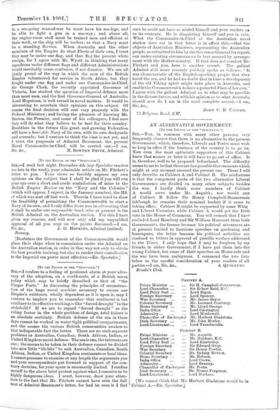rTO THE EDITOR OF THY "SPECTATOR."] Sin,—I confess to a
feeling of profound alarm at your advo- cacy of the adoption, on a world-scale, of a British naval policy which may be briefly described as that of "the Cinque Ports." In discussing the principles of reconstruc- tion of the huge naval machine necessary to secure our Empire's existence, wholly dependent as it is upon it, may I venture to implore you to remember that sentiment is but auxiliary to its effective working,—like "forced draught" in the stokehold ? If we are to regard "forced draught" as the ruling factor in the whole problem of design, total failure is an absolute certainty. British defence of the sea in these days cannot be worked in water-tight political compartments, and the sooner the various British communities awaken to that indisputable fact the better. There are no such separate problems as Australian, Canadian, South African, Indian, or United Kingdom naval defence. The sea is one, the interests are one; the means to be taken in their defence cannot be divided into nice little "tit-bits "to suit Australian, Canadian, South African, Indian, or United Kingdom sentiments or local ideas. I cannot presume to examine at any length the arguments you and your correspondents put forward in support of the con- trary doctrine, for your space is necessarily limited. I confine myself to the above brief protest against what I conceive to be highly dangerous ideas. I must, however, draw your atten- tion to the fact that Mr. Fitchett cannot have seen the full text of Admiral Beaumont's letter, for had he seen it I feel sure he could not have so misled himself and your readers as to its contents. He is disquieting himself and you iii vain. What the Commander-in-Chief oi the Australian naval station does say in that letter is in effect this,—that the objects of Australian Ministers, representing the Australian people, as submitted to him by the Governor-General for report, can under existing circumstances be best secured by arrange- ment with the Mother-country. If that does not comfort Mr. Fitchett and you, here is another crumb. The gallant Admiral still more recently publicly spoke as follows : "It was characteristic of the English-speaking people that they loved the sea, and he had no donbt that in time a development of the old Viking spirit might take place in Australia, and enable the Commonwealth to have a powerful Fleet of her own." I agree with the gallant Admiral as to what may be possible in the distant future, and with his opinion as to what Australia should now do I am in the most complete accord.—I am, Sir, 75 Belgrave Road, S.W. JOHN C. R f'
-OLOMB.














































 Previous page
Previous page